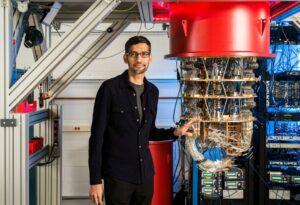Quantum Computing: The Next Frontier in Computing
Quantum Computing
Quantum computing uses quantum bits to perform computations. It has potential applications in cryptography, materials science, machine learning, and more. The field is rapidly developing with promising future prospects.
what is Quantum Computing?
Quantum computing is a type of computing that uses quantum mechanical phenomena, such as superposition and entanglement, to perform operations on data. Unlike classical computers that use bits to represent information, quantum computers use quantum bits or qubits to represent information.
In a quantum computer, information is stored in the state of the qubits, which can be in a superposition of multiple states at once. This allows a quantum computer to perform certain calculations exponentially faster than classical computers. For example, a quantum computer can factor large numbers into their prime factors much faster than a classical computer, which has significant implications for cryptography and data security.
Quantum computing is still an emerging technology, and there are many challenges that must be overcome to make it practical for large-scale use. However, research in this area has already led to significant advances in our understanding of quantum mechanics and has the potential to revolutionize fields such as materials science, drug discovery, and artificial intelligence.
Superposition
Quantum bits or qubits can exist in multiple states simultaneously. This allows a quantum computer to perform many computations at once.
Entanglement
When two qubits are entangled, they become correlated in such a way that the state of one qubit depends on the state of the other, even if they are separated by large distances.
Quantum gates
Quantum gates are the equivalent of classical logic gates in quantum computing. They are used to manipulate the state of qubits and perform operations on quantum information.
Quantum algorithms
Quantum algorithms are algorithms designed specifically for quantum computers. They take advantage of the properties of quantum mechanics to solve problems faster than classical algorithms.
No-cloning theorem
The no-cloning theorem states that it is impossible to create an exact copy of an arbitrary unknown quantum state. This has implications for data security, as it means that quantum encryption methods can be used to transmit information securely.
Decoherence
Decoherence is the process by which the quantum state of a qubit interacts with its environment, causing it to lose its quantum properties. This is a major challenge in building practical quantum computers, as it can cause errors in calculations and make it difficult to maintain the coherence of qubits.
Learn quantum mechanics
To understand quantum computing, it's important to have a good understanding of the underlying principles of quantum mechanics. This includes concepts such as superposition, entanglement, and measurement.
Start with simple problems
Quantum computing can be complex, so it's best to start with simple problems and gradually build up to more complex ones. This can help you develop an intuition for how quantum algorithms work and how to program a quantum computer.
Use high-level tools
There are many high-level tools available for programming and simulating quantum algorithms. These tools can help you avoid some of the low-level details of quantum computing and focus on the problem you're trying to solve.
Pay attention to qubit counts
Quantum computers have limited numbers of qubits, so it's important to pay attention to qubit counts when designing algorithms. You may need to find ways to optimize your algorithms to work with fewer qubits.
Think about error correction
Error correction is an important consideration in quantum computing, as the fragile nature of qubits makes them prone to errors. You may need to design error-correcting codes or use quantum error correction techniques to mitigate errors.
Collaborate with experts
Quantum computing is a rapidly evolving field, so it's important to collaborate with experts in the field. This can help you stay up-to-date on the latest developments and best practices, and can help you avoid common pitfalls.
Cryptography and data security
Quantum computers have the potential to break many of the encryption schemes used to protect sensitive data. However, quantum cryptography can also be used to transmit information securely.
Optimization problems
Many real-world optimization problems, such as scheduling and logistics problems, are difficult to solve with classical computers. Quantum internet may provide a more efficient way to solve these problems.
Materials science
Quantum computing can be used to simulate the behavior of atoms and molecules, which can be used to design new materials with specific properties.
Drug discovery
Quantum technology can be used to model the behavior of molecules, which can help in the discovery of new drugs and therapies.
Machine learning
Quantum internet has the potential to improve machine learning algorithms by allowing for faster and more efficient training.
Financial modeling
Quantum technology computing can be used to simulate financial systems, which can help in the development of more accurate financial models.
Overall
Quantum internet is a highly interdisciplinary field that has the potential to impact many different areas of science and technology. However, it is still an emerging technology, and many challenges must be overcome to make it practical for large-scale use.
Online courses
There are many online courses available that cover the basics of quantum technology, including edX, Coursera, and Udacity.
Research papers
The arXiv preprint server has many research papers on Quantum internet and related topics.
Textbooks
There are many textbooks available on quantum computing, including "Quantum Computation and Quantum Information" by Michael Nielsen and Isaac Chuang, "Quantum Computing for Computer Scientists" by Noson S. Yanofsky and Mirco A. Mannucci, and "Introduction to Quantum Computing" by Phillip Kaye, Raymond Laflamme, and Michele Mosca.
Conferences and workshops
Attending conferences and workshops can be a great way to learn about the latest developments in quantum technology and to connect with other researchers in the field. Some popular conferences include the International Conference on Quantum Computing and Engineering (QCE), the Quantum Information Processing (QIP) conference, and the Conference on Quantum Information and Quantum Control (CQIQC).
Open-source software
There are many open-source software tools available for simulating and programming quantum computers, including Qiskit, Cirq, and Forest.
Quantum computing communities
There are many online communities dedicated to quantum computing, including the Quantum Computing Stack Exchange, the Quantum Computing Forum, and the Quantum Technology Computing Slack channel. These communities can be a great resource for asking questions, sharing ideas, and connecting with other quantum technology enthusiasts.
Quantum Computing Future
The future of quantum technology is very promising, and there are many exciting possibilities for its development and applications. Here are a few potential areas of growth:
Continued development of hardware
Quantum technology hardware is still in its early stages, and there is plenty of room for improvement. Researchers are working to develop more stable and reliable qubits, and to scale up the number of qubits in quantum computers.
Increased accessibility
As quantum technology technology improves, it may become more accessible to a wider range of users. This could lead to more widespread adoption and new applications in fields such as finance, medicine, and materials science.
Hybrid computing
Hybrid computing, which combines classical and quantum computing, is becoming an increasingly popular area of research. This approach can leverage the strengths of both classical and quantum technology to solve problems more efficiently.
Improved quantum algorithms
There is still much to be learned about the best ways to use quantum computers to solve real-world problems. Researchers are working to develop new quantum algorithms that can take advantage of the unique properties of quantum systems.
Quantum internet
The development of a quantum internet, which would use quantum communication to transmit information securely, is a promising area of research. This could have important applications in areas such as data security and cryptography.
Overall
the future of quantum computing is bright, and there is a lot of potential for new applications and discoveries. While there are still many challenges to overcome, researchers are making rapid progress, and the technology is advancing at an impressive rate.
Recommended Articles
Help Your Business Win!
Timely Service





